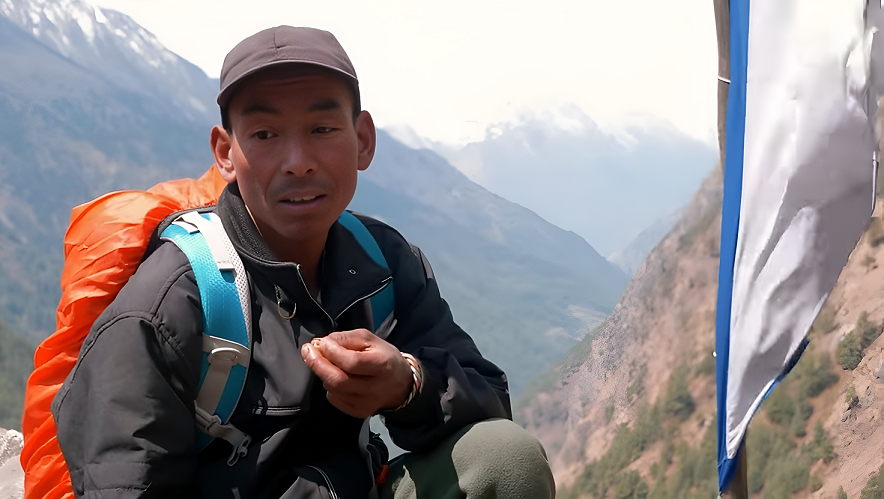LOST YEARS | HERNE KATHA | STATELESSNESS | CITIZENSHIP | STORYTELLING

The voyage of Prakash Tamang from the high Tsum Valley to the flat lands of Jhapa and Bhojpur hills to reunite with his family after 35 years teared viewers, erupting various emotions.
According to the story released on Herne Katha on August 24, Prakash left home with one of his sisters to work as a Galaicha (carpet) weaver in Kathmandu, where he went missing at the age of 10 years. Afterwards, a Tsumba family took him to Gorkha where he worked as a cow herder.
Herne Katha, a popular Nepali language YouTube channel known for curating compelling, unorthodox, and often heart-wrenching stories in the Nepali storytelling landscape, traced Prakash’s story from his mountain village till he returned to his hill village forever, capturing his excitement and anticipation for the world beyond the Tsum valley.
As much as the story and the production team received appreciation for their deed and the emotional depth, they were also scrutinised for ‘subjecting’ the story to ‘poverty porn’. Users on multiple social media platforms echoed that the story failed to cascade on structural issues, while some highlighted that Prakash was exploited like bonded labour all those years.
With board exams at my plate while social media buzzing with memes inanely asking Herne Katha to find “love partners” for them, it all felt like a merry-go-round ride to me. It urged me to add an anomaly to the discourse — identity weaved by citizenship.
Prakash seemed a lot bothered by the question of his age. On three occasions, he expressed regret for not knowing his age or having any official document [citizenship in this case]. First, at his elder sister’s house where a neighbour expressed pity when he couldn’t provide his age. Second, when his elder brother asked him a speculative age. Third, someone off-camera hopefully emphasised that he should obtain citizenship since he met his parents, to which he agreed.
These three instances imply an ingrained significance of citizenship for a Nepali not only to prove their identity to the state but also for personal and social validation. Moreover, throughout the story, Prakash lamented his lost youth and lack of progress [on socio-economic parameters] in his life compared to others.
Recent media reports suggest that he received his citizenship on September 1 after completing the required paperwork (birth certificate and family relationship certificate, among others). The Bhojpur district administration officials reached his doorsteps to grant him the yellow card.
However, for all those lost years, the state could not ensure his citizenship despite constitutional provisions that ensured eligibility once he turned 16. Two reasons that apply prominently in most stateless cases are — (a) the lethargic structure that governs the issuance of citizenship, particularly for children unknown of their parents’ whereabouts; and (b) citizenship has methodically been treated as the prerogative of castes and communities who rule the state apparatus. In his particular case, the first reason applies.
According to an August 30 post on Herne Katha’s Facebook page, Chheten Dondup, son of Tashi (the Tsumba family member), clarifying on various public comments, said that their attempts to secure his citizenship in the past had been unsuccessful. Chheten expressed that things with Prakash would have been easier had he received citizenship.
Meanwhile, on August 28, Prime Minister KP Sharma Oli wrote on his Facebook timeline that he contacted Prakash after watching his story, and directed the Home Secretary to speed up his citizenship process. The PM plans to send him financial support via a bank account, according to the online post. In a separate post on September 2, Oli shared a photo meeting with Prakash and said, “citizenship would ease things [for him]. [I] feel happy.”
Finally, Prakash is likely to get a new kickstart after the country’s top executive office acknowledged his story — thanks to the Herne Katha team. But not all stateless individuals separated from their families experience such a turnaround. Even in his case, we can never really gauge his lost youth.
No official record exists on overall types of stateless situations. Individuals unknown of their parents’ whereabouts and who do not live in child shelters are methodically deprived of citizenship, and their number can exceed thousands. Additionally, hundreds of thousands of individuals under different situations are denied citizenship.
Statelessness is not an agenda for the key leadership anymore, let alone a human rights issue — unless you want to score brownie points by addressing isolated cases that gain attention on popular media platforms. In Prakash’s case, the prime minister acted immediately. This may be the same. Or a genuine act. Yet little does the state and all its machinery care to learn and recognise that there’s him and there’s many more still yearning for their rightful identity.
Read More Stories
Kathmandu’s decay: From glorious past to ominous future
Kathmandu: The legend and the legacy Legend about Kathmandus evolution holds that the...
Kathmandu - A crumbling valley!
Valleys and cities should be young, vibrant, inspiring and full of hopes with...
Nepal’s high-altitude farms are thirsty. Could ice stupas help?
As snowlines rise and mountain springs run dry, Nepals high-altitude communities are facing...